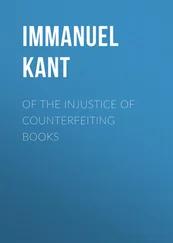In this second edition, I have endeavoured, as far as possible, to remove the difficulties and obscurity which, without fault of mine perhaps, have given rise to many misconceptions even among acute thinkers. In the propositions themselves, and in the demonstrations by which they are supported, as well as in the form and the entire plan of the work, I have found nothing to alter; which must be attributed partly to the long examination to which I had subjected the whole before offering it to the public and partly to the nature of the case. For pure speculative reason is an organic structure in which there is nothing isolated or independent, but every single part is essential to all the rest; and hence, the slightest imperfection, whether defect or positive error, could not fail to betray itself in use. I venture, further, to hope, that this system will maintain the same unalterable character for the future. I am led to entertain this confidence, not by vanity, but by the evidence which the equality of the result affords, when we proceed, first, from the simplest elements up to the complete whole of pure reason and, and then, backwards from the whole to each part. We find that the attempt to make the slightest alteration, in any part, leads inevitably to contradictions, not merely in this system, but in human reason itself. At the same time, there is still much room for improvement in the exposition of the doctrines contained in this work. In the present edition, I have endeavoured to remove misapprehensions of the aesthetical part, especially with regard to the conception of time; to clear away the obscurity which has been found in the deduction of the conceptions of the understanding; to supply the supposed want of sufficient evidence in the demonstration of the principles of the pure understanding; and, lastly, to obviate the misunderstanding of the paralogisms which immediately precede the rational psychology. Beyond this point — the end of the second main division of the “Transcendental Dialectic”— I have not extended my alterations, 10 partly from want of time, and partly because I am not aware that any portion of the remainder has given rise to misconceptions among intelligent and impartial critics, whom I do not here mention with that praise which is their due, but who will find that their suggestions have been attended to in the work itself.
In attempting to render the exposition of my views as intelligible as possible, I have been compelled to leave out or abridge various passages which were not essential to the completeness of the work, but which many readers might consider useful in other respects, and might be unwilling to miss. This trifling loss, which could not be avoided without swelling the book beyond due limits, may be supplied, at the pleasure of the reader, by a comparison with the first edition, and will, I hope, be more than compensated for by the greater clearness of the exposition as it now stands.
I have observed, with pleasure and thankfulness, in the pages of various reviews and treatises, that the spirit of profound and thorough investigation is not extinct in Germany, though it may have been overborne and silenced for a time by the fashionable tone of a licence in thinking, which gives itself the airs of genius, and that the difficulties which beset the paths of criticism have not prevented energetic and acute thinkers from making themselves masters of the science of pure reason to which these paths conduct — a science which is not popular, but scholastic in its character, and which alone can hope for a lasting existence or possess an abiding value. To these deserving men, who so happily combine profundity of view with a talent for lucid exposition — a talent which I myself am not conscious of possessing — I leave the task of removing any obscurity which may still adhere to the statement of my doctrines. For, in this case, the danger is not that of being refuted, but of being misunderstood. For my own part, I must henceforward abstain from controversy, although I shall carefully attend to all suggestions, whether from friends or adversaries, which may be of use in the future elaboration of the system of this propaedeutic. As, during these labours, I have advanced pretty far in years this month I reach my sixty-fourth year — it will be necessary for me to economize time, if I am to carry out my plan of elaborating the metaphysics of nature as well as of morals, in confirmation of the correctness of the principles established in this Critique of Pure Reason, both speculative and practical; and I must, therefore, leave the task of clearing up the obscurities of the present work — inevitable, perhaps, at the outset — as well as, the defence of the whole, to those deserving men, who have made my system their own. A philosophical system cannot come forward armed at all points like a mathematical treatise, and hence it may be quite possible to take objection to particular passages, while the organic structure of the system, considered as a unity, has no danger to apprehend. But few possess the ability, and still fewer the inclination, to take a comprehensive view of a new system. By confining the view to particular passages, taking these out of their connection and comparing them with one another, it is easy to pick out apparent contradictions, especially in a work written with any freedom of style. These contradictions place the work in an unfavourable light in the eyes of those who rely on the judgement of others, but are easily reconciled by those who have mastered the idea of the whole. If a theory possesses stability in itself, the action and reaction which seemed at first to threaten its existence serve only, in the course of time, to smooth down any superficial roughness or inequality, and — if men of insight, impartiality, and truly popular gifts, turn their attention to it — to secure to it, in a short time, the requisite elegance also.
Konigsberg, April 1787.
4 I do not here follow with exactness the history of the experimental method, of which, indeed, the first steps are involved in some obscurity.
5 This method, accordingly, which we have borrowed from the natural philosopher, consists in seeking for the elements of pure reason in that which admits of confirmation or refutation by experiment. Now the propositions of pure reason, especially when they transcend the limits of possible experience, do not admit of our making any experiment with their objects, as in natural science. Hence, with regard to those conceptions and principles which we assume a priori , our only course will be to view them from two different sides. We must regard one and the same conception, on the one hand, in relation to experience as an object of the senses and of the understanding, on the other hand, in relation to reason, isolated and transcending the limits of experience, as an object of mere thought. Now if we find that, when we regard things from this double point of view, the result is in harmony with the principle of pure reason, but that, when we regard them from a single point of view, reason is involved in self-contradiction, then the experiment will establish the correctness of this distinction.
6 This experiment of pure reason has a great similarity to that of the chemists, which they term the experiment of reduction, or, more usually, the synthetic process. The analysis of the metaphysician separates pure cognition a priori into two heterogeneous elements, viz., the cognition of things as phenomena, and of things in themselves. Dialectic combines these again into harmony with the necessary rational idea of the unconditioned, and finds that this harmony never results except through the above distinction, which is, therefore, concluded to be just.
7 So the central laws of the movements of the heavenly bodies established the truth of that which Copernicus, first, assumed only as a hypothesis, and, at the same time, brought to light that invisible force (Newtonian attraction) which holds the universe together. The latter would have remained forever undiscovered, if Copernicus had not ventured on the experiment — contrary to the senses but still just — of looking for the observed movements not in the heavenly bodies, but in the spectator. In this Preface I treat the new metaphysical method as a hypothesis with the view of rendering apparent the first attempts at such a change of method, which are always hypothetical. But in the Critique itself it will be demonstrated, not hypothetically, but apodeictically, from the nature of our representations of space and time, and from the elementary conceptions of the understanding.
Читать дальше












